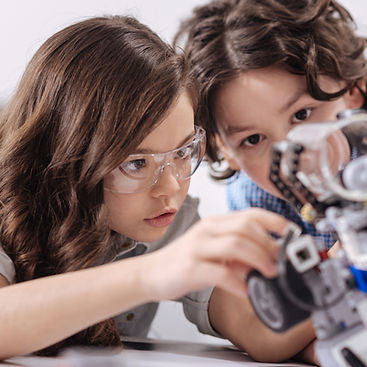
TRAJECT FOR PRIMARY SCHOOL
Primary school
More information about our processes
You may read more about each of our courses' objectives, content, practical organization, teacher(s), and cost below.
ANNUAL TRAJECT omnia

Content
Further details on the course material, learning goals, instructor(s), practical setup, and cost are provided below.We organize the yearly curriculum for third-grade elementary school pupils.
The students in this program are either in the sixth grade (and require more challenge than what can be provided in the classroom) or in the fifth grade (and are thinking about moving up to the first secondary school).
We focus on math, language, science, and French in the morning. We work carefully with each child's requirements in mind to accelerate, widen, and deepen the primary school curriculum (and beyond, such as logic, programming, probability, Latin initiation, science, and economics).
We will work on a variety of projects in the afternoon to address issues like perseverance and teamwork for each of our courses.
YEAR PROJECT problem-solving thinking and mathematics

Inhoud
Each year, we host the 'problem-solving thinking and mathematics' program for pupils who are prepared for the third-grade mathematics curriculum in primary school.
We will examine and greatly expand upon the mathematics taught in the third grade of elementary school during this procedure.
We introduce the new course content in a topical manner (per major subject).
We provide solutions for several (difficult) challenges.
We routinely pick up a new game to play in which we may put our mathematical knowledge and critical thinking skills to good use, as well as applying the content we have learned to actual circumstances.
Additionally, we study many approaches to solving mathematics and other issues.
PROJECT WORK

Content
We set up the project work schedule for first, second, and third grade primary school children (in different groups).
For ten lessons, we work on ten distinct projects. We collaborate a lot and work alone occasionally.
The content of these projects is based on the University of Nijmegen's Vooruitwerklab book, which we have added to with our own content.
Building bridges with pegs, programming, philosophizing, and creating a marble track are examples of possible undertakings.
LEARNING SKILLS

Who is this program for?
We set up the third-grade primary school children' learning skills curriculum.
We cover information processing, searching for information, summarizing, identifying primary and secondary concerns, schematizing, and thinking in five courses.
NUDGE
Who is this process for?
We set up the third-grade primary school children' learning skills curriculum.
We are a partner in the European research project NUDGE, which runs until the end of 2023.
(https://www.nudgeproject.eu/ for additional information)
We have created five courses on energy and nudging (water, electricity, energy supply, gas, and nudging) as part of this project.
We explore "energy" as a theme through cross-curricular teaching.
PROBLEM SOLVING THINKING IN MATH

Content
Students in the second and third grades of elementary school are the target audience for this program (in different groups).
Several approaches to solving challenging mathematical issues are presented to us.
The problems we create are derived from both national and international math contests.
We have the guts to take on challenging issues and have the required knowledge to accomplish so. We collaborate occasionally but work alone most of the time so that we may learn from one another.
We may use the lesson's content to continue working at home or at school.
Following this procedure, we are aware of a few amazing, difficult math games that you may play at home.
STEAM

CONTENT
For third-graders in elementary school, we set up the STEAM trajectory.
We are exposed to STEAM (Science, Technology, Engineering, Art, and Math) over the course of five half days.
A letter is addressed in each session (S, T, E, A and M). Biology, electricity, programming, optical illusions, and mathematics are among the possible subjects.



